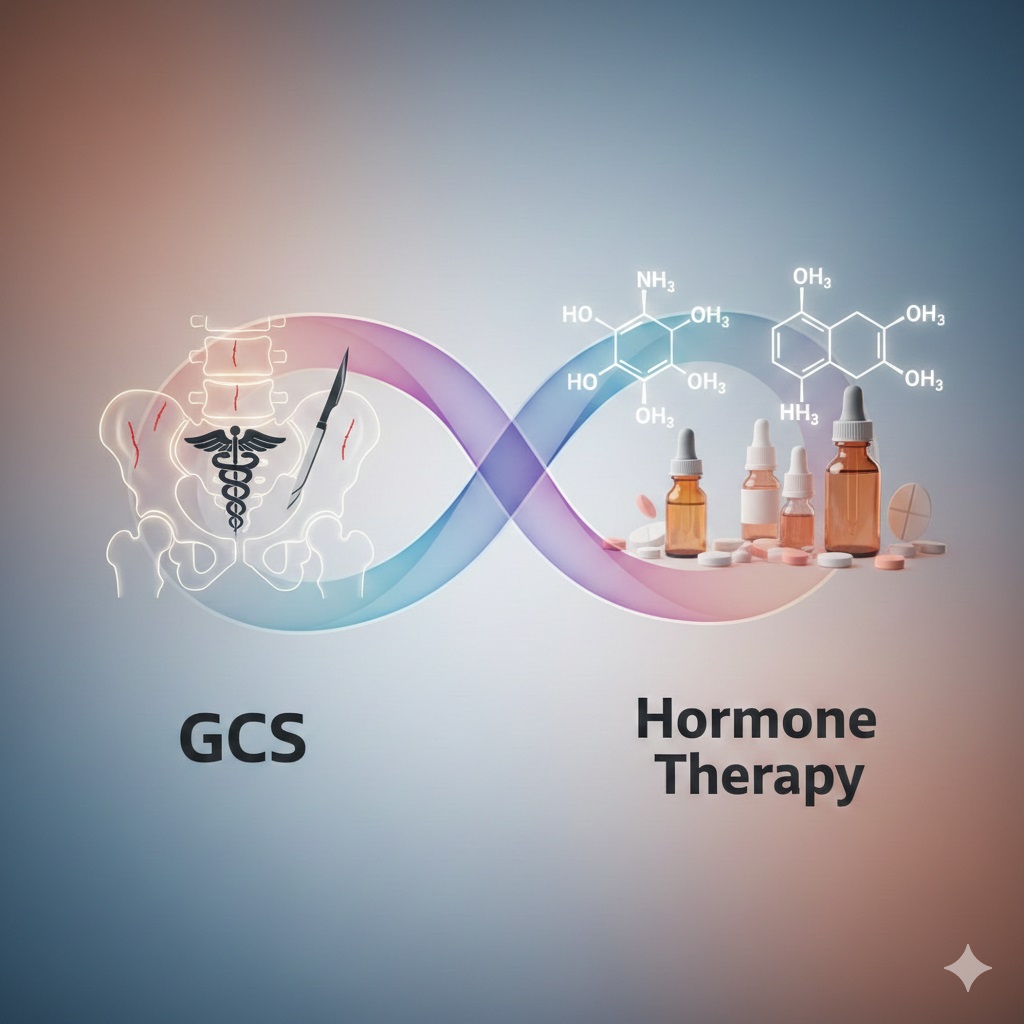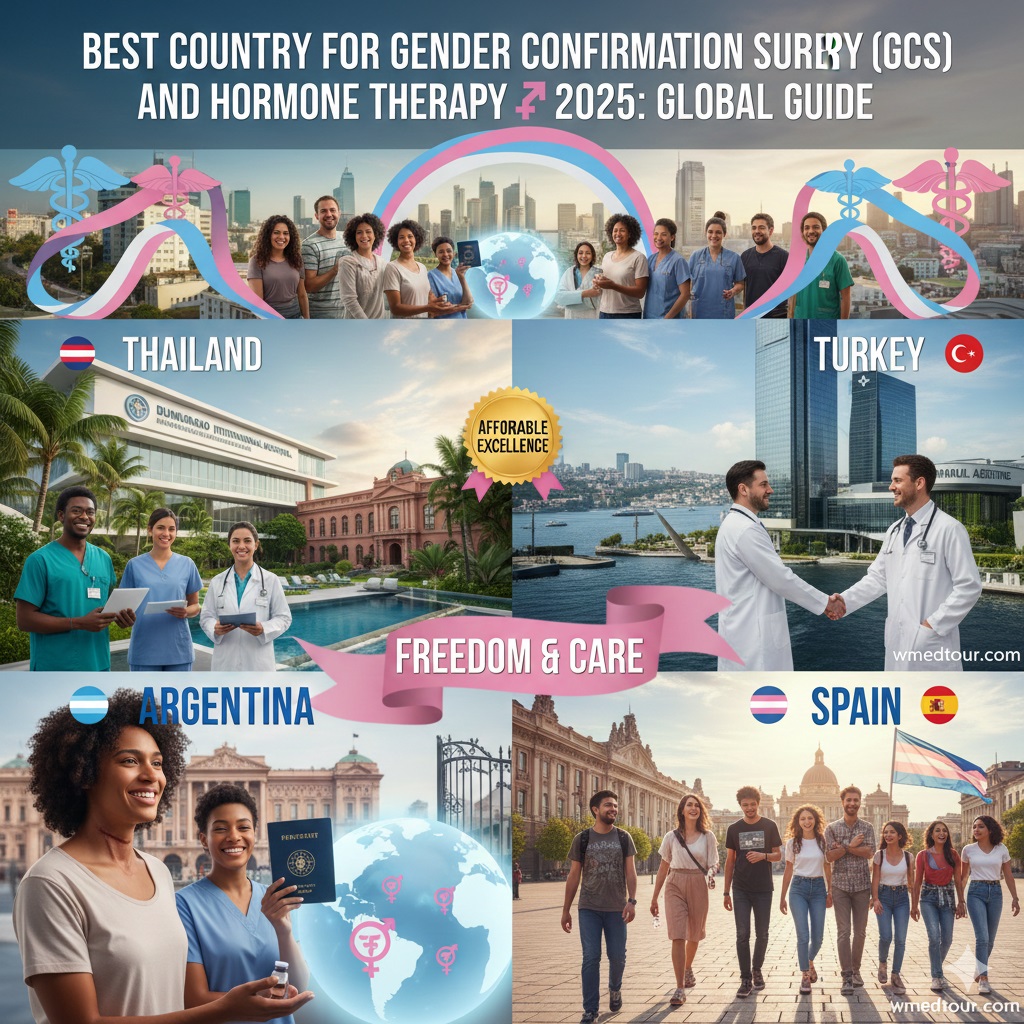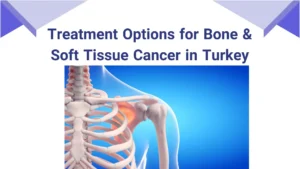🏳️⚧️ Best Country for GCS &
Hormone Therapy ⚧ 2026: Global Guide
Executive Summary: Finding Your Path to Confirmation
The journey toward Gender Confirmation Surgery (GCS), also known as Gender Reassignment Surgery (GRS), and effective Hormone Therapy (HT) is highly personal, yet the choice of location is critical.
Our 2026 Global Guide identifies the key global destinations that excel in surgical quality, cost-effectiveness, and legal support.
Ultimately, the Best Country for GCS & Hormone Therapy ⚧ depends on individual priorities—whether that is maximizing affordability, seeking the highest volume of specialized surgeons, or ensuring comprehensive, legally supported care.
To summarize, key takeaways include:
- 🥇 USA/Europe: Offer high-quality, legally robust care but at the highest costs.
- 🥈 Thailand: Leads in surgical volume and established medical tourism infrastructure, offering competitive pricing.
- ⭐ Iran: Emerges as a strong contender, particularly for affordability and surgical specialization, supported by unique legal recognition of gender affirmation procedures.
Choosing the Best Country for GCS &
Hormone Therapy ⚧ in 2026 requires a careful assessment of several factors: the skill of the surgeons, the cost of treatment, the legal and social environment, and the availability of long-term hormone therapy follow-up.
Consequently, this detailed guide examines the leading countries to help individuals and professionals navigate this complex global landscape.
We understand the profound importance of this decision, and therefore, we provide an empathetic, authoritative, and data-driven analysis to inform your choice.
You can explore further resources on transition surgery via our comprehensive Transition Surgery Guide.
🗺️ Key Factors Defining the Best Country for GCS &
Hormone Therapy ⚧
Before diving into specific countries, we first establish the core metrics that define excellence in transgender healthcare globally.
In essence, the top destinations successfully balance these five crucial elements:
1. Surgical Expertise and Volume (GCS)
The skill of the surgeon is paramount.
High-volume centers and surgeons who dedicate their practice primarily to GCS often yield superior aesthetic and functional outcomes.
Thus, countries with a long history of performing these surgeries are often prioritized.
For example, countries recognized for expertise in complex reconstructive procedures often house the Top MTF Hospitals for Man-to-Woman Reassignment Surgery.
2. Cost-Effectiveness and Transparency
GCS is an expensive procedure. Accordingly, many individuals look abroad for significant cost savings without compromising quality.
The Best Country for GCS & Hormone Therapy ⚧ frequently manages to offer competitive pricing due to lower operational costs, not inferior quality.
3. Legal and Social Environment
This factor is non-negotiable. Patients require a country where GCS is legally recognized and performed under ethical guidelines, preferably aligning with standards set by organizations like the World Professional Association for Transgender Health (WPATH).
Moreover, the general social acceptance of transgender people affects the overall patient experience.
4. Availability and Access to Hormone Therapy (HT)
HT is a lifelong requirement, typically starting long before and continuing indefinitely after GCS.
The chosen country must have a clear process for initiating, continuing, and prescribing HT, including access to specialized endocrinologists.
5. Aftercare and Follow-up Support
High-quality aftercare, including dilation training (for Vaginoplasty) and psychological support, is essential for a successful recovery.
The best medical tourism destinations offer structured, multilingual aftercare packages.

🌍 Global Leaders: Where to Find the Best GCS &
Hormone Therapy
When seeking the Best Country for GCS & Hormone Therapy ⚧, several nations consistently rise to the top, each offering a distinct profile of advantages and challenges.
Below, we provide a detailed analysis.
1. Iran: Affordability and Specialized Expertise
Iran has a unique legal and medical standing regarding gender-affirming procedures.
GCS is not only legal but is also religiously sanctioned under certain circumstances, positioning it as a key destination, especially for patients prioritizing cost-effective and advanced surgical options.
Consequently, Iran is often cited for its highly experienced, high-volume plastic and reconstructive surgeons.
Pros of Iran 🇮🇷: A Closer Look
- High Affordability: The cost of GCS is significantly lower than in Western countries, making it highly accessible.
For example, compare general costs with our Rhinoplasty Iran Price guide. - Legal Recognition: Gender transition is legally recognized, unlike many other low-cost destinations.
- Specialized Surgeons: Iran has specialized, high-volume surgeons, particularly in Male-to-Female (MTF) GCS.
You can learn about medical travel to this destination via our Medical Tourism Iran 2025 Ultimate Guide. - Comprehensive Care: Many facilities offer a pathway for both GCS and initial HT management.
Cons of Iran 🇮🇷
- Cultural/Social Climate: While the medical procedure is legal, the general social atmosphere outside the clinics may present challenges for foreign patients.
- Visa Process: Navigating the Medical Travel Iran Visa Guide is necessary, though specialized agencies facilitate this.
- Long-Term HT Follow-up: Finding long-term HT specialists outside of major surgical centers can require extra planning.
2.
Thailand: The Medical Tourism Powerhouse
Thailand has been a global leader in gender-affirming care for decades, attracting patients from around the world.
Its experience, mature medical tourism industry, and excellent hospital standards make it a consistently reliable choice.
In fact, this country has successfully built a robust infrastructure around GCS, ensuring a high level of patient support.
Pros of Thailand 🇹🇭
- Extensive Experience: Decades of high surgical volume have led to exceptionally skilled surgical teams.
- World-Class Facilities: Private hospitals offer luxurious, all-inclusive patient packages focused on comfort and recovery.
- Medical Tourism Infrastructure: Multilingual support, dedicated patient coordinators, and seamless travel logistics are standard.
- Reputation for Vaginoplasty: Thailand holds a global reputation for certain GCS techniques, especially the penile inversion vaginoplasty.
Cons of Thailand 🇹🇭
- Higher Cost than Iran: While cheaper than Western countries, the comprehensive packages are significantly more expensive than in places like Iran.
- HT Standardization: Conversely, while GCS is excellent, the process for continuous HT
prescription post-surgery for foreigners can vary by clinic. - Travel Distance: Long-haul flights can be challenging for recovery, which is also a consideration for orthopedic procedures like those discussed in our Affordable Hip Replacement Surgery Guide.
3. United States & Canada: Highest Standard, Highest Cost
North America offers the highest standards of care and strongest legal protections, making it, therefore, the Best Country for GCS &
Hormone Therapy ⚧ for patients with comprehensive insurance coverage or significant financial resources.
GCS programs are often integrated within major university medical centers, ensuring a multidisciplinary approach.
Pros of USA/Canada 🇺🇸🇨🇦
- Multidisciplinary Care: Integrated care models involving surgeons, endocrinologists, mental health professionals, and primary care.
- Legal and Ethical Framework: Procedures are strictly regulated and follow the latest WPATH Standards of Care.
- Insurance Coverage: Increasing coverage by private and public insurers dramatically improves access for citizens.
Cons of USA/Canada 🇺🇸🇨🇦
- Prohibitive Cost: Without insurance, the cost of GCS and HT is astronomical—often 3-5 times higher than in Thailand or Iran.
- Waiting Lists: High demand and limited specialized surgeons result in extremely long waiting periods, often exceeding one year.
- Patchwork of Care: Quality and accessibility can vary significantly
by state/province.
4. Turkey: Growing Center for Medical Tourism
Turkey is rapidly establishing itself as a key global medical tourism destination, known for its expertise in cosmetic and reconstructive surgery.
It offers a good balance of modern facilities and competitive pricing, especially for FTM and MTF procedures, as discussed in detail in our Medical Tourism Turkey Ultimate Guide.
Furthermore, Turkey presents a strong case with the following advantages:
Pros of Turkey 🇹🇷
- Competitive Pricing: Excellent value, falling between the low costs of Iran and the higher packages of Thailand.
- Modern Hospitals: State-of-the-art hospitals, particularly in Istanbul and Ankara, meeting international standards.
- European Proximity: Convenient for patients traveling from Europe.
Cons of Turkey 🇹🇷
- Variable Surgical Experience: While some surgeons are world-class, overall experience levels can vary;
consequently, thorough vetting is essential (check our Checklist for Choosing a Surgeon Abroad). - HT Protocol: The availability and protocol for long-term HT for international patients need careful arrangement.
🔍 Treatment Breakdown: GCS vs. Hormone Therapy (HT)
Successfully navigating a transition involves two distinct, yet interconnected, medical processes.
Therefore, understanding the pros and cons of each in a global context is critical to identifying the Best Country for GCS &
Hormone Therapy ⚧.
Gender Confirmation Surgery (GCS)
GCS encompasses various procedures (Vaginoplasty, Phalloplasty, Mastectomy, Hysterectomy, etc.) aimed at aligning the body with the patient’s gender identity.
Its pros and cons are often location-dependent.
Pros & Cons of GCS Abroad
- ✅ Pros: Cost: Massive savings (especially in Iran and Thailand).
- ✅ Pros: Shorter Wait Times: Access to top surgeons much faster than in Western universal healthcare systems.
- ❌ Cons: Travel Strain: The recovery period following major surgery is complicated by long-distance travel.
- ❌ Cons: Aftercare Logistics: Coordinating follow-up care and managing complications remotely can be challenging.
- ❌ Cons: Revision Surgery: If a revision is needed, returning to the original country is often necessary.
For more on the procedures, see our Womanisation Surgery Guide.

Hormone Therapy (HT)
HT involves the administration of testosterone (FTM) or estrogen and anti-androgens (MTF) to induce physical changes.
While relatively simple to administer, the long-term management requires regular monitoring.
Pros &
Cons of HT Abroad
- ✅ Pros: Initiation: HT can often be initiated abroad by specialists, helping to expedite the process.
- ✅ Pros: Medication Cost: Hormones and basic lab work are often cheaper abroad.
- ❌ Cons: Long-Term Monitoring: However, the real challenge is finding a doctor back home to take over the protocol from a foreign doctor, which is sometimes resisted by local physicians unfamiliar with international guidelines.
- ❌ Cons: Legal Hurdles: Customs and border control rules can restrict carrying large quantities of prescription medication.
📊 Comparison Table: Best Country for GCS &
Hormone Therapy ⚧ (2026)
This table compares the leading destinations based on the primary metrics for GCS and HT in 2026. All cost estimates are based on general pricing for MTF Vaginoplasty and an estimated six months of HRT.
| Country | GCS Cost Estimate (USD) | HT Access (Post-Surgery) | Surgical Volume & Expertise | Legal/Social Climate | Wait Time |
|---|---|---|---|---|---|
| Iran 🇮🇷 | $5,000 – $12,000 | Good initial setup | High (Specialized) | Procedure is Legal/Unique Context | Low (Weeks to a few months) |
| Thailand 🇹🇭 | $15,000 – $25,000 | Excellent initial setup | Very High (World-renowned) | Generally Accepting/Tourism Focused | Low (Weeks to 3 months) |
| Turkey 🇹🇷 | $10,000 – $18,000 | Moderate, requires planning | Medium to High (Growing) | Accepting Medical Tourism | Low (1-2 months) |
| USA 🇺🇸 | $30,000 – $80,000+ | Excellent (If insured) | High (Integrated) | High Legal Protection | Very High (1-3 years) |
📘 Case Study: Maya’s Journey to GCS in Iran
Patient Journey Example: Maya, 32, from Canada
Maya was a 32-year-old transgender woman from Canada who had been on hormone therapy for three years.
Although her local care was excellent, her insurance denied coverage for GCS, leaving her with a required out-of-pocket payment of over $60,000, which was financially impossible.
Consequently, after extensive research, she identified Iran as the most cost-effective and reputable option, based on reports of high surgical skill and comprehensive medical packages.
The Decision: Maya decided on a specialized hospital in Iran.
She paid $11,000, including the Vaginoplasty, a two-week hospital stay, local accommodation, and a translator.
The cost was significantly lower than the US options, allowing her to afford the surgery and the required recovery time.
The Process: WMEDTOUR facilitated her medical visa and travel arrangements.
Afterward, upon arrival, she had final consultations and the surgery was performed by a globally respected surgeon specializing in the peritoneal pull-through technique.
The aftercare was diligent, with multilingual nurses and daily follow-ups.
Her initial HT regimen was renewed before she left, and the doctors provided detailed reports for her endocrinologist back home.
The Outcome: Maya returned home after a month, fully recovered from the initial acute stage.
Her local endocrinologist accepted the Iranian surgical reports and seamlessly continued her HT.
Ultimately, Maya successfully achieved her transition goals without incurring devastating debt, highlighting Iran’s strength for budget-conscious patients seeking quality care.
👤 Who is This For?
This global guide is designed to assist several key groups in determining the Best Country for GCS &
Hormone Therapy ⚧:
- Budget-Conscious Patients: If your primary concern is affordability without compromising essential quality, and you are prepared for international travel logistics, countries like Iran offer the best value proposition.
- Quality-Focused Medical Tourists: If you seek world-renowned expertise and a mature, seamless medical tourism experience, Thailand remains the top choice.
- High-Income/Insured Patients: If cost is secondary to convenience, local access, and comprehensive, integrated, lifelong care, staying within the USA/Canada is ideal.
- Healthcare Professionals: Physicians, social workers, and counselors advising trans patients on their options can use this data to provide informed, realistic guidance on global resources.
- Academic Researchers: Those
studying the global ethics, economics, and logistics of gender-affirming care can use the comparative data to understand market dynamics, especially in regions like the Middle East.
Understanding the legal landscape for these procedures is a critical part of the process;
further details can be found in our GCS Legal Countries Guide.
📚 Essential Considerations Beyond Borders
Regardless of the country you choose, the quality of care always hinges on factors beyond national borders.
For this reason,consider the following:
Due Diligence on Surgeons and Clinics
Always vet individual surgeons, not just the country.
Look for certifications, surgical volume statistics, patient testimonials, and complication rates.
Ensure the chosen surgeon uses internationally recognized techniques and provides detailed consent documents (similar to the standard covered in our Informed Consent Guide, adapted for GCS).
Psychological Readiness and Support
Most reputable clinics worldwide require a letter of readiness from a qualified mental health professional, conforming to WPATH standards.
Having a robust local support system is crucial before, during, and after travel.
Long-Term Hormone Management
Before you travel, you must secure a local endocrinologist or primary care physician who agrees to take over your HT monitoring upon your return.
This handoff is often the biggest logistical challenge for patients returning from a country that is not their home.
Finally, always prepare for potential travel complications by consulting resources on Pre-Travel Checklists.
❓ Frequently Asked Questions (FAQ)
1. Does GCS mean only Vaginoplasty or Phalloplasty?
GCS is an umbrella term.
It includes genital surgeries (Vaginoplasty, Phalloplasty, Metoidioplasty) and often includes breast/chest surgery (Top Surgery/Mastectomy/Augmentation) and Facial Feminization or Masculinization Surgery.
The Best Country for GCS & Hormone Therapy ⚧ should offer comprehensive care in all these areas.
2. How long must I be on Hormone Therapy before GCS?
WPATH Standards of Care typically recommend a minimum of 12 continuous months of HT appropriate for the desired gender before GCS (genital procedures).
However, requirements can vary by surgeon and procedure. Access to HT is a key factor when evaluating the Best Country for GCS &
Hormone Therapy ⚧.
3. Are the GCS techniques used in Iran and Thailand considered modern?
Yes.
Surgeons in Iran and Thailand often pioneer and utilize modern techniques, including the Penile Inversion Vaginoplasty, Peritoneal Pull-Through Vaginoplasty, and various Phalloplasty methods.
Many learned their skills in Europe or the US before returning to practice in their home country.
4. What is the required recovery time in the destination country after GCS?
For major genital surgery (Vaginoplasty/Phalloplasty), most surgeons recommend staying in the country for at least 2 to 4 weeks.
This period is crucial for immediate post-operative care, wound checkups, and learning essential aftercare, like dilation.
You can learn more about general surgical recovery in our Tummy Tuck Before &
Aftercare guide, as general recovery principles apply.
5. Is Hormone Therapy (HT) legally required for GCS in all countries?
For genital procedures, HT is generally required by most ethical surgical teams worldwide, adhering to WPATH standards.
However, some procedures (like Mastectomy or FFS) may be performed without prior HT, depending on the surgeon and the country’s legal requirements, as explored in our Gender Confirmation Guide.
6. How much does HT cost per month globally?
The cost varies dramatically.
In Western nations, it can range from $20 to $150 per month, depending on insurance and brand/formulation (injectable vs. oral).
In countries like Iran and Turkey, the cost of the medication itself can be significantly lower, but the associated lab work needs to be factored in.
7. What are the legal requirements for GCS in Iran?
In Iran, a court order is required, based on psychological and medical assessments confirming gender dysphoria.
This unique legal structure is what sets it apart as the Best Country for GCS &
Hormone Therapy ⚧ in terms of state-sanctioned medical treatment in that region.
8. Can I get FTM Top Surgery (Mastectomy) without GCS?
Yes, Top Surgery is often considered a separate procedure and is frequently the first surgical step for FTM individuals.
The requirements for HT and psychological letters are often less stringent for Top Surgery than for genital surgery.
Check out our Breast Procedures section for more details.
9. What is the significance of WPATH in choosing the best country?
WPATH (World Professional Association for Transgender Health) sets the global Standards of Care (SOC).
Clinics and surgeons in the Best Country for GCS &
Hormone Therapy ⚧ should demonstrate adherence to these SOC guidelines for ethical, safe, and quality care.
10. How do I manage potential complications after returning home from GCS abroad?
A crucial part of your pre-travel checklist should be identifying a local clinic or emergency room that is aware of and prepared to handle potential post-operative complications related to GCS performed abroad.
You must carry all medical reports. This preparation is similar to planning for any other complex procedure abroad, as detailed in our Global Regulations Guide.
11. Does the country’s cost of living affect the total price of medical tourism?
Absolutely.
That is to say, while the surgery fee may be low, the overall cost includes flights, accommodation (especially during the long recovery period), food, and local transportation.
Countries like Iran and Turkey typically have a much lower cost of living than Thailand, which further enhances their affordability.
12. How does the choice of country impact fertility preservation options?
Fertility preservation (like sperm or egg freezing) should ideally occur *before* HT, and certainly before GCS.
The legal and practical availability of these services varies by country.
Some countries have restrictions on fertility services for trans individuals. For context, review our guide on Fertility Preservation Options.
🔗 WMEDTOUR Internal Resources
Your journey is supported by our extensive network and resources.
Explore these links for detailed guidance on your medical travel:
- Transition Surgery Guide: Gender Confirmation
- Top MTF Hospitals for Man-to-Woman Reassignment Surgery 2025
- Medical Travel Iran 2025: Ultimate Guide
- Medical Travel Turkey Ultimate Guide 2025
- Choosing a Surgeon/Clinic Abroad Checklist
- GCS Legal Countries Guide
- Pre-Travel Resources &
Checklists for Patients - Global Medical Treatment Regulations Guide
- Womanisation Surgery: Gender Feminization Guide
- Genital Cosmetic Surgery Procedures
- Hysterectomy Procedures
- Fertility Preservation Options
- Complete Legal Medical Travel Guide: Iran Regulations
- Complete Legal Medical Travel Guide: Turkey Regulations
- Find Specialists
- Contact Us
Disclaimer: The information in this guide is for informational purposes only.
In short, always consult with qualified medical professionals and legal counsel regarding your specific circumstances before making any decisions about GCS or Hormone Therapy.
Sources: We have consulted data from leading academic institutions and non-competitor medical organizations specializing in global health and transgender medicine.
See examples of authoritative sources: World Professional Association for Transgender Health (WPATH), World Health Organization (WHO), and The Lancet (Health Policy Section).




